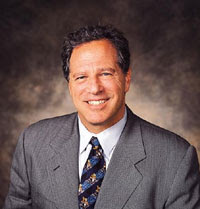Especially given the history of high profile verbal snafus that have publicly plagued scores and scores of public figures. In a totally different context than stem cell research, the Klein flap recalls presidential aspirants who have been given serious media fits as the result of misguided rhetoric, either from themselves or associates. One only has to look at the Obama-Clinton race to see major political figures wrestling with verbal gaffes.
But the reality is that the comments from Robert Klein's lobbying group, Americans for Cures, concerning an influential state lawmaker's intelligence, knowledge and political fortitude are not even close to making the front page of any newspaper. They may be outrageous, an incredible display of bad judgment and reflect poorly on California's $3 billion stem cell research program, but they do not cut the media mustard.
We cannot find even a single story on the comments in any newspaper in California, much less a current story dealing with the underlying conflicts of interest posed by Klein's dual roles as head of a stem cell lobbying organization and chairman of the leading source worldwide of funding for human embryonic stem cell research. Only two Internet sites that we know of have picked up on the matter, The Niche stem cell blog of Nature magazine and Larry Ebert's IPBiz blog. Monya Baker of Niche largely provided a neutral summary of the events. Ebert made reference to what he called ongoing bungling at CIRM.
We asked one mainstream media reporter about the reasons for the lack of coverage, promising anonymity to guarantee candor. The response:
We also asked John M. Simpson, stem cell project director of Consumer Watchdog, for his views on the media coverage. Simpson had a long career as a newspaper editor prior to holding his current position. He said,
"It was an easy call that it was not as important as the many other stories on my plate. You know how it goes: Mainstream media has to deal with many more topics than most blogs, including the California Stem Cell Report. For instance, Dave Jensen doesn't have to worry about sharing space on his blog with stories on the price of oil, or failing banks, or city council meetings and murder trials. Blogs also are not expected to meet the same journalistic standards as newspapers, which means they can run items with one source and lots of opinion. And they can touch on the same topic in many different posts, giving incremental developments.
"Meanwhile, newspapers try get several sources and views into one story. We are also dealing with budgetary, staffing and news hole cuts. That means reporters in mainstream media are covering much, much more than just CIRM and stem cells. (CIRM is just one small piece of my very broad and complicated beat.) All that means that I must be much more selective in what I write about."
"The news business is in a terrible state. Newsroom staffs have been slashed. Every news organization is trying to do more with less and that's simply impossible.With 30 years experience in journalism, we do not disagree with either our anonymous reporter or Simpson. But we can also add that coverage of state agencies has traditionally been given short shrift in California. It is easier to cover the governor, political activities and only the highest profile legislative issues.
"Complex ongoing stories, like CIRM and its governance structure, get short shrift in the face of the current crisis in journalism.
"Until somebody figures out a new viable financial model to support quality journalism, we going to see less and less coverage of issues like this. I don't want to sound hysterical, but I think good democratic government is seriously threatened by the sorry state of the mainstream media."
CIRM is off the current agenda for the mainstream media. Does that mean that the issues or specifics involved in the Klein-Kos-Kuehl affair are not important? Far from it. The posting by Americans for Cures was destructive of CIRM's goals. Ironically, the action increased the likelihood that the bill will pass. The vitriol demonstrated indirectly that CIRM is not to be trusted in sensitive dealings. It showcased once again flaws in Klein's leadership that surfaced as long ago as 2005. And it highlighted one of the conflicts that pervade CIRM's board of directors.
The California stem cell experiment is a remarkable endeavor. It has achieved much. But much more remains to be done. CIRM directors should look to finding ways to foster cooperation – not only with the international stem cell community – but here in California, where the home fires are now in need of some renewed and careful tending.



